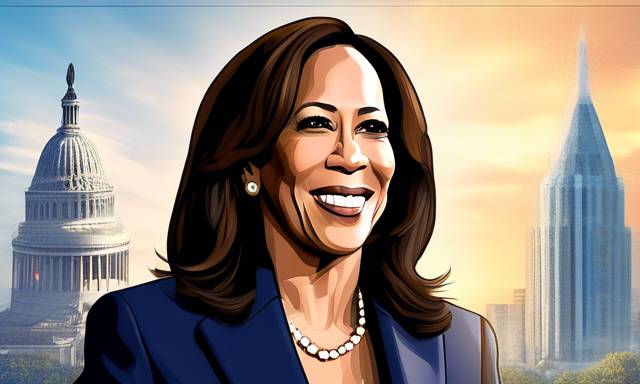Kamala Harris Advocates for Digital Innovation in Pittsburgh 🇺🇸
During a recent campaign event in Pittsburgh on September 25, 2024, Democratic presidential candidate Kamala Harris expressed her intent to support and encourage the advancement of emerging technologies such as digital assets, contrasting her vision with that of her rival, Donald Trump.
Harris Emphasizes Blockchain and Technology at the Economic Club of Pittsburgh 💡
At her speech hosted by The Economic Club of Pittsburgh, Harris reaffirmed her commitment to an innovation-centric agenda. She emphasized the importance of the U.S. positioning itself as a leader in blockchain technology, stating, “We will invest in biomanufacturing and aerospace, remain dominant in AI and quantum computing, blockchain, and other emerging technologies, and expand our lead in clean energy innovation and manufacturing.”
While she acknowledged the potential of cryptocurrency and blockchain, Harris hinted at her strategy for supporting crypto-friendly regulations. She did not delve into specifics but reiterated her belief in lifting innovative technologies while safeguarding consumer interests. “We will encourage innovative technologies like AI and digital assets while protecting consumers and investors,” she stated, outlining a vision for a secure and transparent regulatory framework for businesses.
Donald Trump’s Campaign Trail and Crypto Platform Launch ⚡️
Harris’s comments emerge at a pivotal moment in the electoral race, with recent surveys indicating a diminishing lead between her and Trump. As Trump rallies support across key battleground states, he has recently introduced his cryptocurrency initiative, World Liberty Financial. He has proclaimed a strong stance against the current U.S. Securities and Exchange Commission (SEC) Chair Gary Gensler, promising to take drastic measures if he wins the presidency.
Trump has gained traction among crypto enthusiasts, primarily due to his criticism of the SEC’s aggressive enforcement policies towards the digital asset industry. In his recent speeches, Trump has warned that if he doesn’t win the presidency, those investigated within the crypto realm may face intensified scrutiny once his opponent takes office. “If for some reason bad things happen and we don’t win the election, those people that were under investigation… they will be living in hell because it will start the day after the election if they win,” he declared, emphasizing his commitment to advocating for those in the crypto space.
Alongside Harris, notable figures from the blockchain industry, such as billionaire investor Mark Cuban, have shown support for her campaign. As both candidates articulate their vision for digital assets, they highlight the contrasting approaches they would take regarding the regulatory landscape and innovative technology fostering in the U.S.
Implications of Emerging Technologies in the 2024 Election 💻
This electoral cycle highlights the growing importance of technology, particularly blockchain and digital assets, in shaping policy discussions. As candidates sharpen their platforms around innovation, their strategies may significantly influence the direction of the U.S. economy and regulatory environment for emerging technologies.
Harris’ message reflects an inclination toward fostering an environment conducive to innovation while ensuring consumer protections, a balance that many in the crypto community are keenly observing. Conversely, Trump’s focus on dismantling perceived barriers put forth by regulators indicates a simpler approach aimed at alleviating burdens on the crypto market.
Individuals engaged in the cryptocurrency and tech sectors are closely monitoring these developments, aware that the outcome of the upcoming election may not only determine the political leadership but also influence long-term policies affecting the industry.
Hot Take on the Future of Cryptocurrency Regulation 🔮
The ongoing discourse around cryptocurrency regulation in this election reflects a crucial crossroads for the industry. Harris’s supportive stance on technology versus Trump’s critical viewpoint on regulatory enforcement brings forth a range of potential futures for digital assets in the United States.
Your approach towards understanding these candidates’ perspectives may be vital in interpreting how upcoming regulations could unfold. Whether one anticipates a more structured regulatory framework or a deregulated environment, it’s evident that technology’s role in the political landscape will continue to evolve dramatically. As both candidates articulate their visions, their strategies will likely have lasting effects not just in 2024, but well beyond.





 By
By

 By
By
 By
By
 By
By
 By
By